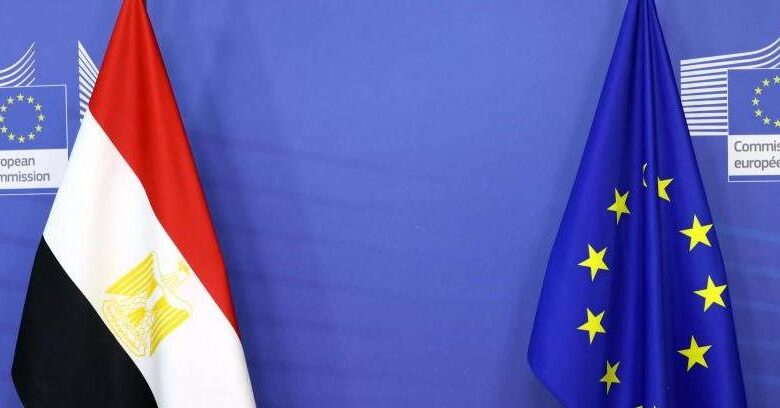
Economic relations between Egypt and the European Union (EU) have witnessed remarkable development as EU countries remain Egypt’s leading trading partner.
In March 2024, the two sides elevated their cooperation to the level of a “Comprehensive and Strategic Partnership”, alongside the announcement of a €7.4 billion European financial package for Egypt, reflecting mutual determination to deepen trade and investment cooperation and turn it into a genuine engine for development, especially in the fields of energy, manufacturing and infrastructure.
According to EU ambassador to Egypt Angelina Eichhorst – in previous remarks relations between Egypt and the EU represent a genuine partnership based on mutual understanding.
The EU diplomat said the EU is the world’s largest market and its signing of major agreements with Egypt sends a message of confidence in the Egyptian economy.
The EU is the world’s largest market and its signing of major agreements with Egypt sends a message of confidence in the Egyptian economy, she added.
Eichhorst noted that trade exchange between Egypt and the EU exceeded $32 billion and is expected to grow further, highlighting Egypt’s flexibility and success in improving the quality of its agricultural products, which strengthened its exports to Europe.
The Egypt-EU Summit in Brussels further consolidates the existing partnership and reflects the two sides’ shared vision and commitment to common interests and sustainable development, based on their long-standing ties.
According to data from the Ministry of Planning, Economic Development and International Cooperation, Egypt received €1 billion from the EU under the “Macroeconomic Support and Budget Assistance” mechanism by the end of 2024.
The ministry continues to follow up on the implementation of the second phase within the framework of the National Structural Reform Program.
Economic cooperation between Egypt and the EU supports investment opportunities and sustainability plans, given that the EU is one of the world’s largest and strongest economies, with a GDP of about $19.42 trillion in 2024.
The bloc is also known for its advanced technological industries, strong agricultural and industrial base and status as the world’s largest trading power.
The euro serves as the official currency for 19 of the 27 EU member states and is the second most used currency globally.
Egypt, for its part, continues to implement structural reforms aimed at enhancing productivity and investment-driven growth, focusing on high value-added sectors such as industry, tourism, energy and logistics.
The International Monetary Fund (IMF) has confirmed that the Egyptian economy has shown tangible improvement over the past two years since the launch of the economic reform program, noting significant progress in macroeconomic stability.
The IMF expects Egypt’s economic growth rate to reach 4.3% in FY 2024/2025, rising to 5.6% in FY 2025/2026, with public debt levels gradually declining.
Egypt’s national economic reform narrative aims to define a sustainable development model, ensuring macroeconomic stability and a shift toward high-productivity, complex sectors.
Meanwhile, the European Bank for Reconstruction and Development (EBRD) – the leading multilateral development bank in private sector financing – continues to play a key role in supporting Egypt-EU cooperation.
Egypt has made progress in implementing strategic projects through its strategic partnership with the bank, which contributes to the EU Investment Guarantee Mechanism, encouraging both local and foreign investments and empowering the private sector through an integrated strategy that aligns with Egypt’s national priorities. This includes advancing the green transition, developing SMEs and supporting public-private partnerships.
EU data show that bilateral trade between Egypt and the EU increased significantly – from €23 billion in 2014 to €32.5 billion in 2024. Egypt’s exports to the EU focus on fuels, mining products, chemicals and agricultural goods, while agri-food exports rose from €650 million to €2.3 billion, particularly in fruits and vegetables. The EU also remains Egypt’s top foreign investor, with total investments reaching €27.6 billion in 2022.
Both sides continue working to improve the trade and investment environment to boost mutual growth and development. During the 2024 Egypt-EU Investment Conference, a number of special investment agreements were signed, alongside the launch of the Sustainable Green Industry Program and the NEXT MED regional cooperation funding agreement.
Additionally, the EU allocated €206 million for the first three years of the Multiannual Indicative Program (2021–2027) for bilateral cooperation with Egypt, focusing on green and sustainable development, human capital development, economic resilience and social progress.
Between 2014 and 2020, EU grants to Egypt totaled €756 million, in addition to more than €650 million in grants since 2008, which helped attract approximately €8 billion in concessional loans from European financial institutions through public and private co-financing.




